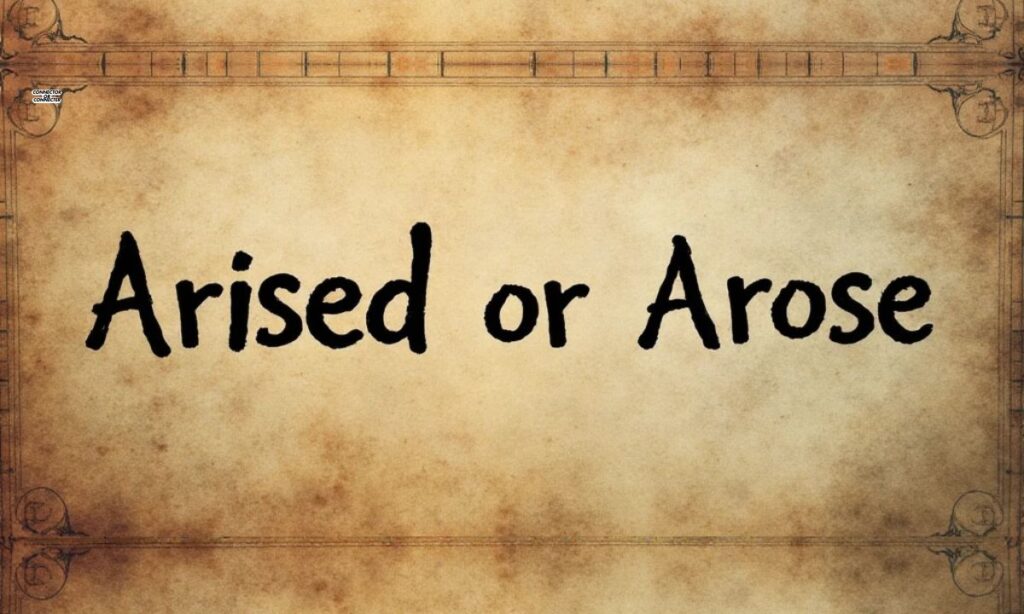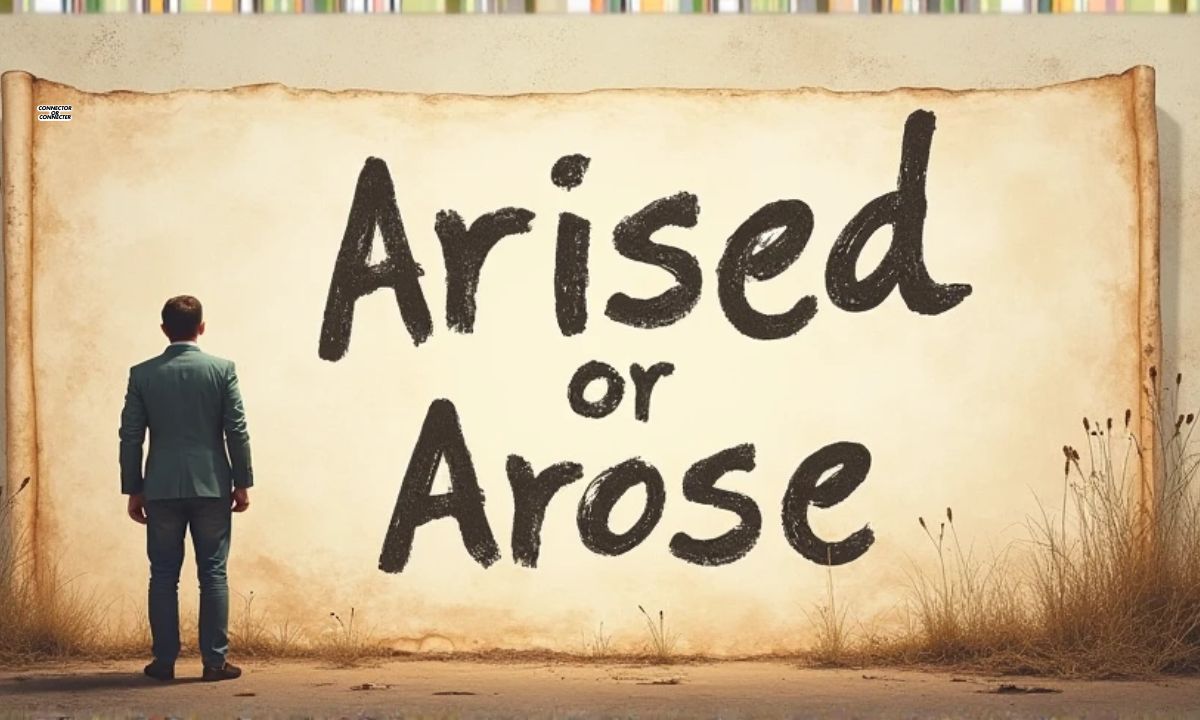Have you ever found yourself hesitating between “arised” and “arose” while writing? You’re not alone in this grammatical puzzle. Many writers and speakers grapple with irregular verbs in English, and “arise” often causes particular confusion.
Whether you’re crafting an important email or writing a formal report, knowing the correct past tense can make the difference between polished and amateur communication.
Let’s unravel the mystery of the past tense of arise and settle this common confusion once and for all with a comprehensive exploration.
What Does Arise Mean?
Beyond its basic definitions, “arise” carries subtle nuances that make it particularly useful in professional and academic contexts. In business settings, it often describes emerging challenges or opportunities. In scientific literature, it frequently appears when discussing the development of new phenomena or theories. The versatility of this verb makes it an essential tool in sophisticated English expression.
The verb “arise” carries multiple meanings in English, all connected to the concept of emergence or appearance. In its most basic form, it means to come into existence, occur, or become apparent. Think of the morning sun emerging from the horizon – it arises. But the word’s versatility extends far beyond literal meanings.
Key meanings of arise include:
- To come into being or to originate
- To become evident or known
- To move upward; to ascend
- To emerge from a source
- To awaken or get up
Arise Synonyms
Interestingly, the synonyms of “arise” vary significantly based on regional English variations. While British English speakers might prefer “materialise,” American English speakers often opt for “materialize.”
In Australian English, you might hear “crop up” more frequently. These regional differences add another layer of complexity to mastering this verb’s usage.
Understanding synonyms helps grasp the full scope of “arise.” Here’s a comprehensive list of alternatives:
| Formal Context | Casual Context | Specific Usage |
| Emerge | Pop up | Dawn (for daybreak) |
| Originate | Crop up | Spring up |
| Manifest | Show up | Surface |
| Materialize | Come about | Develop |
| Transpire | Turn up | Stem from |
Arised or Arose: What’s the Correct Past Tense of Arise?
The evolution of English verbs shows us that irregular forms often persist in the most commonly used words. “Arise” falls into this category, which explains why it maintains its irregular conjugation despite the language’s general trend toward regularization.
This persistence of irregular forms in frequently used verbs is a fascinating phenomenon observed across many languages.
Past Tense Forms of Verbs: The Case of “Arise”
Let’s clarify this once and for all: “arose” is the correct past tense of arise. This verb follows irregular conjugation patterns:
- Present: arise
- Past: arose
- Past Participle: arisen
Examples of “Arise” in Sentences:
“Several questions arose during the meeting.”
“Complications have arisen from the new policy.”
“The need for change arose suddenly.”
The Roots of “Arise”: A Historical Look
Linguistic research reveals fascinating connections between “arise” and similar words in other Germanic languages. The Old Norse “rísa” and Modern German “reisen” share common ancestry with our English “arise,” demonstrating how deeply rooted this verb is in Indo-European language history. This shared heritage helps explain why the irregular conjugation pattern has remained so resistant to change over centuries.
The historical roots of arise trace back to Old English “ārīsan,” combining ‘a-‘ (up, out) with ‘risan’ (to rise). This etymology explains why it follows irregular verb patterns rather than the standard ‘-ed’ ending. Understanding these roots helps explain why we say “arose” rather than “arised.”
The Debate: Arised vs Arose
The persistence of this debate reflects a broader linguistic phenomenon called “regularization pressure,” where speakers naturally tend to apply regular patterns to irregular verbs.
This pressure has caused some irregular verbs to become regular over time (like “helped” replacing the old form “holp”), but “arose” has remained steadfast, likely due to its frequent usage and strong presence in formal writing.
The confusion between “arised” and “arose” represents a classic case of irregular verb conjugation confusion. While English verbs typically form their past tense by adding ‘-ed’, irregular verbs follow unique patterns inherited from Old English.
Why “Arised” is Wrong
Studies in language acquisition show that even native English speakers sometimes struggle with irregular verbs until age seven or later. This explains why “arised” appears not only in learner English but occasionally in native speech as well. Understanding this developmental pattern helps us recognize why this error persists despite clear grammatical rules.
Using “arised” represents one of the most common mistakes with irregular verbs. Here’s why it’s incorrect:
- It applies regular verb rules to an irregular verb
- It ignores historical language patterns
- It’s never been accepted in standard English
How to Use Arise in the Past Tense
Professional writing experts note that mastering “arise” in its past tense forms particularly matters in legal and business documentation. The precise timing of when something “arose” can have significant implications in contracts, court documents, and corporate communications, making this distinction far more than just a grammatical nicety.
Example 1: In an Email
“An urgent situation arose that requires your immediate attention.”
Example 2: In a Formal Report
“Several challenges arose during the implementation phase, leading to significant insights.”
Rise vs Arise: What’s the Difference?
Modern corpus linguistics research shows fascinating patterns in how “rise” and “arise” are used differently in contemporary English. While “rise” appears more frequently in concrete, physical contexts, “arise” dominates in abstract and professional discourse, appearing three times more often in academic writing than its simpler cousin.
Understanding the rise vs arise differences is crucial for proper usage:
| Rise | Arise |
| Typically refers to upward movement | Suggests emergence or occurrence |
| Often literal | Often metaphorical |
| “The sun rises” | “Questions arise” |
Verb Conjugation Rules and Irregular Verbs
Cognitive linguistics studies suggest that irregular verbs like “arise” actually follow subtle pattern classes that make them easier to remember when grouped together. Understanding these underlying patterns can transform seemingly random irregularities into logical, learnable systems.
English grammar rules for irregular verbs can seem complex, but they follow historical patterns. Here’s a simplified guide to verb conjugation patterns:
- Regular verbs: add -ed (walk → walked)
- Irregular verbs: change vowel sounds (sing → sang)
- Special cases: complete form change (go → went)
Common Irregular Verbs
Research into the frequency of English verbs shows that the most commonly used verbs tend to be irregular, with “arise” falling into this pattern. This phenomenon, known as “conservation of irregularity,” helps explain why these forms persist despite their apparent complexity.
Similar patterns appear in other irregular verb conjugation examples:
- Write → wrote → written
- Ring → rang → rung
- Begin → began → begun
- Sing → sang → sung
Usage of “Arise” in Context
Contemporary corpus analysis reveals that “arise” appears most frequently in academic and legal texts, where it’s used about 40% more often than in general writing. This distribution pattern highlights its importance in professional and formal contexts, where precision and sophistication matter most.
The key to mastering examples of arise usage lies in understanding its contexts:
- Formal writing: “Issues arose during the investigation.”
- Academic context: “Several theories have arisen from this research.”
- Business setting: “Opportunities arose from the market shift.”
Arose Or Arised

Let’s settle this common confusion once and for all: “arose” is the correct past tense form of “arise,” while “arised” is incorrect. This is because “arise” belongs to a special group of irregular verbs that change their vowel sounds to form the past tense, rather than adding “-ed.” Think of it like “write/wrote” or “drive/drove” – these verbs follow similar patterns.
Many writers stumble on this point because English has a strong tendency to regularize verbs with the “-ed” ending. However, “arise” maintains its irregular form due to its Old English roots and frequent usage in formal contexts.
Arise Past Tense
The full conjugation of “arise” goes like this:
- Present tense: arise
- Simple past tense: arose
- Past participle: arisen
- Present participle: arising
Common usage examples:
- “The sun arises each morning.” (present)
- “A problem arose during the meeting.” (past)
- “Several issues have arisen from this decision.” (past participle)
- “New challenges are arising daily.” (present participle)
Arose Vs Arisen
These two forms serve different grammatical functions:
“Arose” is the simple past tense, used for completed actions in the past:
- “The question arose during the discussion.”
- “She arose early that morning.”
- “Complications arose unexpectedly.”
“Arisen” is the past participle, used with helping verbs (have, has, had):
- “The issue has arisen before.”
- “Problems had arisen from the policy change.”
- “New opportunities have arisen this quarter.”
Arise In Past Tense
When using “arise” in past tense contexts, remember these key points:
- For simple past events:
- “The need arose suddenly.”
- “Concerns arose from the proposal.”
- For past perfect constructions:
- “The situation had arisen unexpectedly.”
- “After questions had arisen, we scheduled a meeting.”
- For past continuous situations:
- “Issues were arising more frequently.”
- “Opportunities were arising daily.”
Remember: Think of “arise/arose/arisen” following the same pattern as “write/wrote/written” or “drive/drove/driven.” This mental connection can help you consistently choose the correct form.
Each form has its specific use, and mastering them will strengthen your professional and academic writing. Never use “arised” – it’s a common mistake that can undermine your credibility in formal contexts.
Conclusion: Arose vs Arised
Language evolution studies suggest that while many irregular verbs have become regular over the centuries, “arise/arose” shows no signs of regularization, likely due to its frequent use in formal contexts and its strong phonological pattern shared with other irregular verbs like “rise/rose.”
Remember these key points about the correct past tense:
- Always use “arose” as the past tense
- Use “arisen” with helping verbs (have, has, had)
- Never use “arised”
By mastering these distinctions, you’ll handle this irregular verb with confidence in any context. Keep practicing, and soon using “arose” will become second nature in your writing and speaking.

